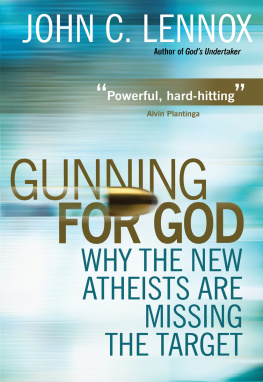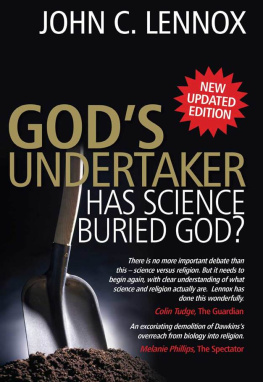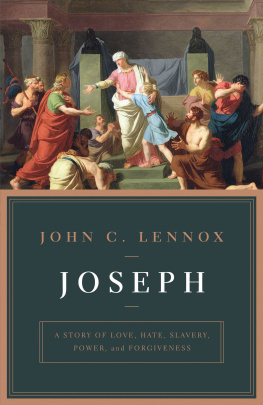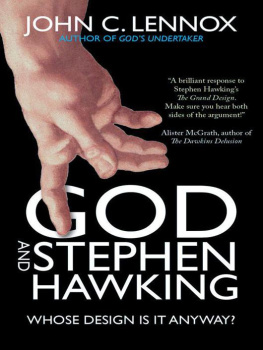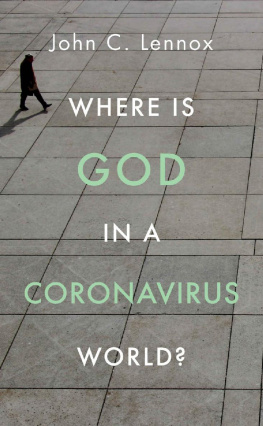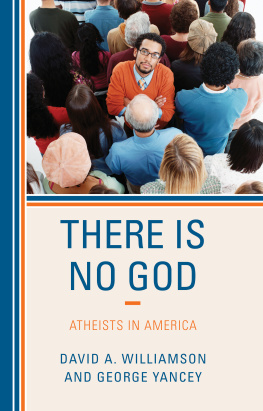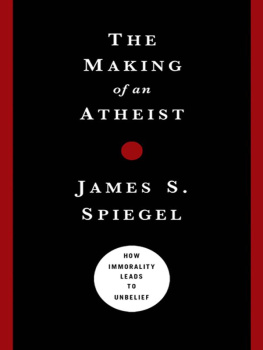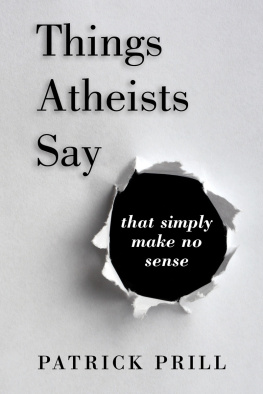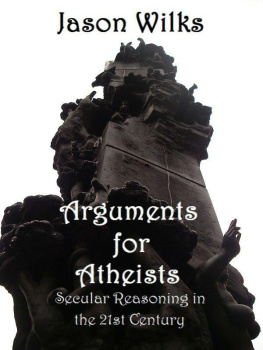Even if they cant be herded, cats in sufficient numbers can make a lot of noise and they cannot be ignored.
Richard Dawkins
Theres probably no God, now stop worrying and enjoy your life.
British Humanist bus advertising campaign
Atheism is on the march in the Western world. Noisily. A concerted attempt is still being made to marshal the atheist faithful, to encourage them not to be ashamed of their atheism but to stand up and fight as a united army. The enemy is God. They are gunning for God. The biggest gun, otherwise known as the former Oxford Professor of the Public Understanding of Science, has been Richard Dawkins. In 2005 he was voted by the magazine Prospect UK as one of the three leading public intellectuals in the world. His book The God Delusion , published in 2006, has dominated best-seller lists and sold over 2 million copies in English alone.
However, there is now an even bigger gun, certainly so far as scientific credentials are concerned the Cambridge theoretical physicist Stephen Hawking. For years Hawking appeared to have left the question of God open. At the end of his best-selling A Brief History of Time he wrote: If we discover a complete theory it would be the ultimate triumph of human reason for then we would know the mind of God. co-authored with Leonard Mlodinow, he claims there is now no room for God. Richard Dawkins is delighted, of course, and speaking of God he says: Darwin kicked him out of biology, but physics remained more uncertain. Hawking is now administering the coup de grce.
Trailing behind Dawkins come a phalanx of lesser calibre but equally trigger-happy fusiliers. First, the highly articulate British-born, US-based Christopher Hitchens, a writer and professor of liberal studies in New York, who has written God is not Great .
The anti-God adrenalin is not only running in the English-speaking world. In France the most prominent activist is, unsurprisingly, not a scientist but a philosopher. He is the prolific author Michel Onfray, who has written In Defence of Atheism . The Vatican is not amused by his parody of the Latin blessing, in which he replaces the Trinity by Pythagoras, Archimedes, and Newton.
Dawkins hopes that he can orchestrate an atheist revival although the task, he feels, is as tricky as the proverbial herding of cats: Even if they cant be herded, cats in sufficient numbers can make a lot of noise and they cannot be ignored. Well, he, as Cat herder-in-Chief, and his colleagues are certainly showing how to make plenty of noise. Whether that noise can be resolved into intelligible language is another matter entirely.
One attempt they have made to get their message across is by advertising it on the sides of buses. For a time bendy buses became the medium that carried the atheist message. They charged around the UKs major cities bringing the remarkably underwhelming missive: Theres probably no God, now stop worrying and enjoy your life. Apart from the advertisement for a well-known beer, there are probably very few advertisements containing the word probably. After all, can one imagine being caught by advertisements like: This medicine has probably no serious side effects; this bank will probably not collapse; this plane will probably get you to your destination? Yet Richard Dawkins was prepared to dip into his own pocket to help finance the campaign.
Not to be outdone, German atheists, failing to get permission from local authorities to mount a similar campaign on public buses, rented one of their own to carry the message. In grand teutonic style it carefully announced: There is (with probability bounding on certainty) no God. A fulfilled life needs no faith. As the bus toured Germany it was shadowed by another, similar, vehicle, hired this time by Christians. It, more modestly, simply asked a question: And what if He does exist? The media were delighted at the sight of both buses parked together in city after city. The net effect? God was firmly on the agenda.
Now I imagine that the word probably may well have been included for legal reasons, to avoid prosecution under trade-description legislation. The atheists realize, of course, that they could not amass enough evidence to convince a court that the probability of Gods existence was zero; and if it is not zero, then Gods existence is possible. Come to think of it, the a priori probability of Richard Dawkins existence is very low. His existence, like that of the rest of us, is improbable. In spite of that, lo and behold, Richard Dawkins, you and I, are all actual. The message on the bus is beside the point. The real question is not, How probable is God? but rather, Is there evidence that God is actual?
If we have not yet boarded the atheist bus, we might well want to ask what kind of a God is it whose existence is deemed improbable? The slogan proudly informs us that it is a God whose existence is associated (at least in atheist minds) with worry and lack of enjoyment no doubt with the implication that atheism is the fount of joy that will dismiss this gloomy God and alleviate all of lifes concerns.
Mathematician David Berlinski comes in with a reality check:
The thesis that if there is no God, then disbelievers may contemplate many new enjoyments prompts an obvious question. Have atheists, at least, stopped worrying and begun to enjoy their lives? To be sure, it has not been widely observed that prominent atheists have in recent years blistered their conscience with anxiety. Short of retiring into a coma, it is hard to imagine how Richard Dawkins, Sam Harris, Daniel Dennett or Christopher Hitchens could have stopped worrying more than they had already stopped worrying and so hard to credit atheism for their ebullience.

